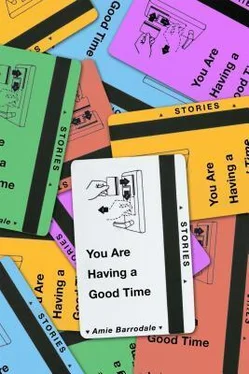I was really confused, so I went to get some air. I stood up out of the bed and went to look out the window. I stuck my head out and looked down at the alley, where a homeless man was digging through the garbage for glass bottles. I was really messed up, so I couldn’t remember what to do. I was trying to remember if it was proper to throw money down at him. Somehow, I knew it wasn’t right, but I couldn’t figure out why, so I leaned back into the apartment and went to find my wallet. I looked for it out in the front room, and then I remembered where I left it. Yes, I was thinking, it definitely was what you did: you threw the money down. That was when I realized that Koko had put the phone down, and she was crying. She had been explaining, for how long I am not sure, that her mother had cancer. She told me that her mother had cancer of the bowels. I tried to console her; I sat beside her and put an arm around her shoulders. She let me hold her for a second, and then she stood up, and in a moment, she had her keys, and a door slammed, and she was gone. The cat was doing a little dance with its claws, that dance that’s somehow associated with cat sex, and I was alone on her bed. It wasn’t until recently I realized that whole thing about her mother was a lie. Besides, when I was consoling her, I wasn’t really consoling her at all.
Anyway, it was a long time before she came back. The sorts of things I thought during that time, while I sat there, I can never really say. It was heavy. I think that’s what people say — it was a bad trip; it was heavy. I think I can safely say it changed my life.
It was called The Imp . Victor Vargas had written a note on the cover, in pencil. “Read this and call me when you’re done.” The note was beside a drawing of what looked like a plume of smoke. Later Libby saw that the smoke had a wild-eyed, mischievous face and multiple curled fists.
When she called, an English woman told her Victor was out. He returned the call in the middle of the night.
“Is this an okay time to talk? I haven’t caught you sleeping?”
“I’m awake.”
“Are you sure? What time is it there?”
“I don’t know. I guess it’s the middle of the night. All my clocks stopped because of the earthquake.”
“Oh dear, Libby, you have to reset them. You have to keep a schedule, and you can’t do that if you don’t know the time. Let’s see, it’s eleven a.m. here, so it would be what time there? Three a.m. Are you ordinarily awake at three a.m.?”
“To be honest, I haven’t been sleeping.”
“Insomnia,” he murmured. “I’m sorry to hear that. I know what it’s like. I had insomnia for all of 1985. Where are you, anyway? Are you in bed?”
“I haven’t gotten out of bed for two weeks. I just ended a relationship, not that I guess you want to hear about that kind of thing.”
“Why wouldn’t I want to hear about it?”
“Presumably you have more interesting, more relevant topics to attain to.”
“Perfect!”
“What?”
“To attain to. I like that for Kate. Hold on, I want to jot that down.” He laughed. “I caught you at the right time. I’m normally not awake this early, but I went to Japan a few weeks ago and my circadian rhythms are still out of sync.”
She sat up and arranged the pillows. Victor Vargas was calling her in the middle of the night and talking about one of the leads in the script he’d sent. All her previous roles had been supporting, or ensemble casts.
“Why were you in Japan?”
“Oh, money. I was there to arrange funding on the movie. I hate the country, though. I walk into a restaurant and bust the floor. I’m not even kidding, Libby. I put my foot through the floor of a restaurant, it was the tatami, and of course they’re Japanese, so they have to be polite about it. On our last morning, we had to get to the airport before dawn, and we decided to visit a shrine before heading off, but then we got turned around, so I went to ask a young policewoman directions, and she wouldn’t tell me. I joined my traveling companion and said, ‘I don’t know why, but she won’t tell me.’ My traveling companion pointed at my crotch and said, ‘It might have something to do with that.’ My pants were unzipped and my penis was hanging out. Hey, Libby? I really loved you in Bob’s last picture. I really think you’re terrific.”
Libby walked the cordless into the kitchen and got a bottle of wine out of the refrigerator. Victor Vargas was praising particulars of her face in complicated ways, as if they were choices she’d made.
“And your voice. There’s something so unusual about your voice, and it isn’t the accent, though I love your accent, Libby.”
“My accent?”
“Well, it’s subtle, but it is there — I hear it. It’s Southern, right?”
“Houston, Texas — born and raised.”
“Your whole life? What’s that like?”
“Oh, you know. Texas. Blondes and big houses and things of that nature.”
“Things of that nature.”
“What?”
“Just another weird idiosyncratic line for Kate.”
He asked her again what Texas was like. She described her apartment complex, and her mother, and admitted she’d never met her father. She told Victor Vargas about her mother’s previous marriage and how it had ended. She told him the story of her mother’s first husband shooting himself in the leg in a Sonic drive-in. “The car filled up with smoke, and he said, ‘Don’t worry, it went all the way through.’” Then she told him how her mom slept a lot, and her earliest memories were of wandering around the apartment complex alone.
“I went into other apartments and got into their closets. I remember eating a jawbreaker off some closet floor. I had to tear it out of the carpet fuzz, because somebody’d already sucked on it. One day, some kids threw dirt into our house, and I was too young to close the door. Later I saw a movie, and kids were doing that, or someone was, and I finally understood why.”
“ Close Encounters of the Third Kind. ”
“That’s right!”
“Richard Dreyfuss, before he got so annoying.” He was satisfied with himself for knowing, like a kid trying to impress her. He gossiped about Richard Dreyfuss. He said the actor had been misdiagnosed bipolar and suffered from lithium poisoning. “I spoke to him during one of his so-called rapid cycles — the man was bored. He’s an overgrown child.” He said Dreyfuss had been using an earpiece for his lines for more than twenty years. When she said, “Interesting,” he laughed for a long time, and then he spoke bitterly about naturalistic acting. “He had most of his training at the synagogue.”
“I had most of my training at the synagogue.”
“Well.” He communicated, in the silence, that she was a better actor and a better person than Richard Dreyfuss. And the funny thing was, she believed it.
The sky lightened — they must have been talking for three hours when he said, “What about the domestic violence?”
“The what?”
“It’s in Act II, you read all of it?”
“I did, but I’ve been so out of it. Oh, you mean the party!”
“When her husband punches her in the face two times, Libby, yes. The party.”
“Well, doesn’t she ask for it?”
“I don’t know, does she? Is she really asking to be hit?”
“She says, clear as day, you know, hit me again.”
“There’s a difference between wanting to be hit and asking to be hit again.”
Libby cleared her throat.
Victor said, “I wondered if she’d slept with another man downstairs and was trying to allay her guilt by placing him in a position of doing worse.”
“I didn’t see that in the script.”
Читать дальше












